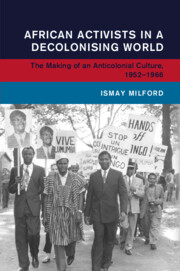Book contents
- African Activists in a Decolonising World
- Global and International History
- African Activists in a Decolonising World
- Copyright page
- Contents
- Figures
- Maps
- Acknowledgements
- Abbreviations
- Introduction
- 1 Regional Learning
- 2 Information Sources
- 3 Before Accra
- 4 Publicity and Violence in the Shadow of Algeria
- 5 Conspiracy in the Congo
- 6 Radio Waves
- Conclusion
- Bibliography
- Index
Conclusion
Published online by Cambridge University Press: 02 March 2023
- African Activists in a Decolonising World
- Global and International History
- African Activists in a Decolonising World
- Copyright page
- Contents
- Figures
- Maps
- Acknowledgements
- Abbreviations
- Introduction
- 1 Regional Learning
- 2 Information Sources
- 3 Before Accra
- 4 Publicity and Violence in the Shadow of Algeria
- 5 Conspiracy in the Congo
- 6 Radio Waves
- Conclusion
- Bibliography
- Index
Summary
This short conclusion pulls together the implications of tracing this cohort’s work and thought, through the conceptual framework of an anticolonial culture, for our understanding of the social and intellectual processes that accompanied legal-constitutional decolonisation. It focuses on the broader and less state-centric picture that emerges, on the importance of a regional framework to arrive at this ‘distributed’ history, and on the merits of microhistorical methods for revising heroic narratives of both national liberation and global solidarity projects. A new intellectual history of anticolonialism could thus make more room for social histories and collective labour.
Keywords
Information
- Type
- Chapter
- Information
- African Activists in a Decolonising WorldThe Making of an Anticolonial Culture, 1952–1966, pp. 245 - 252Publisher: Cambridge University PressPrint publication year: 2023
